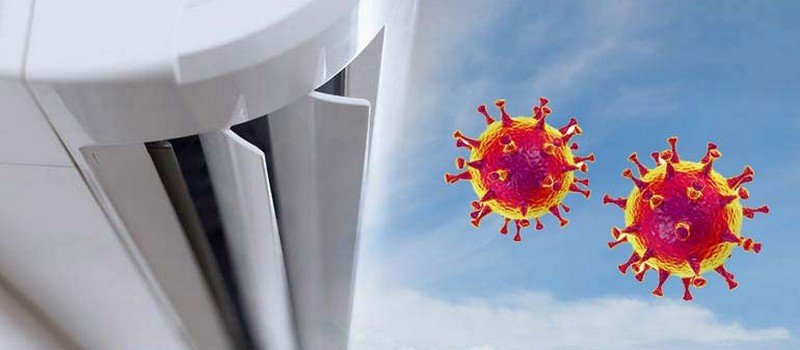With the UK lockdown finally lifted and businesses starting to reopen, everyone has been preparing their workplaces to be COVID compliant so employees and customers can safely return. It has been suggested that social distancing will continue until we have a vaccine (or treatment) for the virus, which could be another year.
Many supermarkets, restaurants and offices rely on air conditioning to circulate air and regulate temperature. This article looks at whether or not air conditioning systems can spread Coronavirus during this pandemic.
What we know about COVID-19
According to the World Health Organisation, Covid-19 can spread from person to person through small droplets expelled from the nose or mouth when a person coughs, sneezes, exhales or speaks. These droplets land on objects and surfaces around the person.
The virus can then be caught by touching our eyes, nose or mouth after being in contact with these surfaces. Now the important thing to note here is that you can also catch Covid-19 if you breathe in droplets from someone with the virus. Hence why we are urged to social distance 2 meters from other people.
It’s common knowledge that opening doors and windows helps improve air circulation in enclosed spaces with fresh air and oxygen. However many offices, restaurants and shops rely on air conditioning to circulate fresh air and regulate room temperatures.
Currently, there is no direct evidence to show a correlation between air conditioning and the spread of the Coronavirus, despite a recent study of an air-conditioned restaurant in Guangzhou, China, which found coronavirus spread to three separate families eating in a restaurant – all of them sitting in the proximity of the air conditioning unit. The Chinese study is consistent with the ‘droplet spread’ hypothesis and “does not, in any way, imply [Covid-19] is spread by air conditioning”.
Air Conditioning Systems in the Workplace
In the UK, employers must, by law, ensure an adequate supply of fresh air in the workplace and this has not changed. Good ventilation can help reduce the risk of spreading coronavirus, so focus on improving general ventilation, preferably through fresh air or mechanical systems.
Where possible, consider ways to maintain and increase the supply of fresh air, for example, by opening windows and doors (unless fire doors).
Also, consider if you can improve the circulation of outside air and prevent pockets of stagnant air in occupied spaces. You can do this by using ceiling fans or desk fans for example, providing good ventilation is maintained.
The risk of transmission through the use of ceiling and desk fans is extremely low providing there is good ventilation in the area it is being used, preferably provided by fresh air.
Air Conditioning and COVID-19
The risk of air conditioning spreading coronavirus (COVID-19) in the workplace is extremely low as long as there is an adequate supply of fresh air and ventilation.
You can continue using most types of air conditioning systems as normal. But, if you use a centralised ventilation system that removes and circulates air to different rooms it is recommended that you turn off recirculation and use a fresh air supply.
You do not need to adjust air conditioning systems that mix some of the extracted air with fresh air and return it to the room as this increases the fresh air ventilation rate. Also, you do not need to adjust systems in individual rooms or portable units as these operate on 100% recirculation. You should still, however, maintain a good supply of fresh air ventilation in the room.
Building administrators should maintain heating, ventilation, and air-conditioning systems according to the manufacturer’s current instructions, particularly in relation to the cleaning and changing of filters.
If you’re unsure of any of the above, we advise you contact and ask the advice of an experienced (HVAC) engineer to ensure your workplace AC systems are helping to prevent the spread of COVID-19.
Managing the risk
Business owners and building managers should take responsibility to explore options with the assistance of their technical/maintenance teams to avoid the use of air recirculation as much as possible. They should consider reviewing their procedures for the use of recirculation in HVAC systems based on information provided by the manufacturer or, if unavailable, seeking advice from the manufacturer.
As for air-conditioned offices, shops and restaurants, we know that a risk exists, but most experts are not saying that you should refrain from venturing into public places.
If you do go to a restaurant or any other busy place with air conditioning, continue to practice social distancing, be vigilant about hand-washing and not touching your face, and, as always, stay home if you feel sick or have symptoms of COVID-19.
Air Conditioning systems can, in fact, be used to prevent /control the spread of the Coronavirus by ensuring fresh air is being circulated. The purpose of HVAC systems is to provide and maintain environmental conditions, including proper airflow, heating, and cooling within a certain area or the entire room. Installation of HVAC is one of the most important factors by which you can combat infection, and at the same time create environmental comfort.
We can help secure your workplace
At ADK, we can help to ensure your AC systems are working efficiently and within the guidelines of being COVID secure. Planned preventative maintenance visits can be arranged with clients tailored to their personal requirements within a timescale to suit their business needs and budgets. Tailoring our works for minimal disruption to your schedule, we’ll ensure that your air conditioning systems are maintained and cleaned to ensure fresh air is circulated in your workplace to help to prevent the spread of the Coronavirus.
For more information about our air conditioning services, please get in touch with us today or call 0208 831 8900 and we’ll be more than happy to help you with anything you need. Alternatively, you can contact us to request an engineer and site survey.






